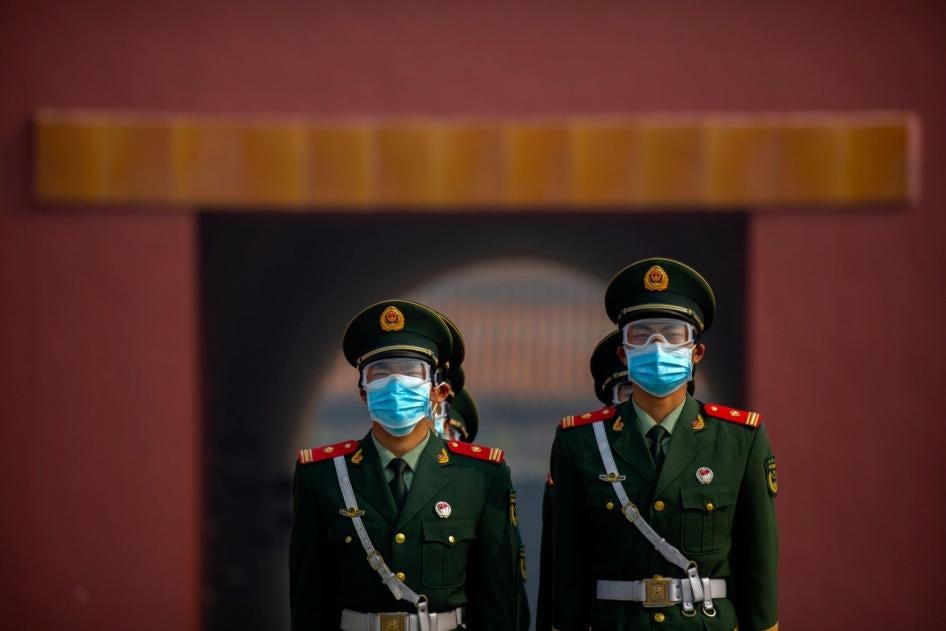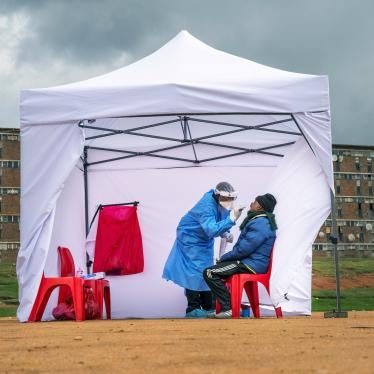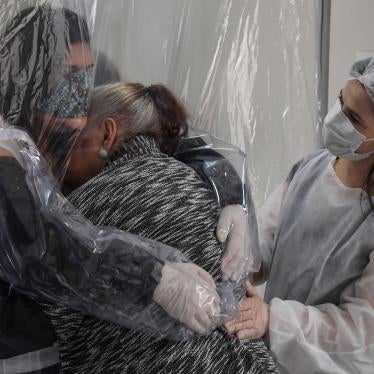Some governments around the world are using the pandemic to claim that human rights are a luxury we cannot afford. With the crisis as a pretext, they are arresting critics, intensifying surveillance, and seizing broad emergency powers. The underlying assumption is clear: safeguarding human rights is a nicety that must be jettisoned when times get tough.
In fact, though, the pandemic has also turned out to be an opportunity to promote human rights—not only as a matter of principle, but also for reasons of pragmatism. The crisis has shown that officials who ignore human rights jeopardize our health, while respecting human rights is the best public health strategy.
Good health policy, for example, requires timely access to accurate information, so governments can quickly respond to any threat. The early stages of the pandemic in Wuhan illustrate the danger of suppressing speech about public health.
Steeped in the dictum that no news should tarnish the image of President Xi Jinping, the Chinese authorities initially censored rather than heeded the Wuhan doctors who warned of a new SARS-like coronavirus, and falsely denied that there was human-to-human transmission. According to a study by the University of Southampton, even just a one-week head start in responding to the virus could have reduced its prevalence in China by 66 percent by the end of February. Before the Chinese authorities imposed travel restrictions, millions of people fled or passed through Wuhan, enabling the virus to go global.
Today, some governments are following China in censoring critics of their response to the virus. Offending governments include Egypt, Turkey, Bangladesh, Thailand, Cambodia, and Bolivia. They invariably claim that they want to ensure people receive accurate information. The real aim is often to sideline political opponents or silence dissidents. Free speech serves public health. Censorship kills.
Denying people access to information about health care has a comparable effect. Internet shutdowns—a convenient way for governments to prevent criticism from spreading—also undermine people’s ability to learn how to protect themselves from the virus. Failure to address the digital divide, whether due to poverty or discrimination, has the same effect.
A similar dynamic is at play concerning the right to privacy. Several countries are developing apps for mobile phones using Bluetooth technology that could alert us if we were near someone found to have been infected by the coronavirus. Such apps will be effective only if large numbers of people willingly download and use them—something they are unlikely to do if they feel their governments are using the app as a pretext to monitor them. Protecting the right to privacy serves public health.
Or take everyone’s right to access health care. Respect for that right will deter governments from focusing scarce resources (such as protection, treatment or vaccines) on their mainstream constituents while ignoring marginalized communities, opposition strongholds, racial or ethnic minorities, or simply the front-line workers, many of them low-income, minorities, or women, in retail, services, transport, and health care. Governments must also avoid prioritizing treatment of the coronavirus to the neglect of people’s other health needs; that, too, is a violation of people’s right to effective health care.
Again, there are pragmatic as well as principled reasons to respect this right. The virus does not observe social barriers. A neglected population—whether migrant workers in Singapore, asylum seekers on the Greek Islands, displaced people in South Sudan, meat-processing workers in the United States, or inmates in overpacked prisons around the world—can become an incubator for the virus. Once it thrives in one community, the virus will have little trouble jumping societal divisions, international borders, or even prison walls to infect others. Discrimination and exclusion can kill. Equal rights protect us all.
Perhaps the ultimate threat is from governments that assume excessively broad “emergency” powers. International human rights law recognizes that certain rights must give way in time of crisis—such as our right to travel or congregate during an infectious-disease outbreak—so long as restrictions are lawful, necessary and proportionate. Yet leaders around the world are using the pandemic to strengthen their rule, dismantle checks and balances, and escape accountability at the expense of our rights. All of these behaviors run counter to effective health care policy, and can easily backfire.
When systems of democratic accountability are in place, politicians, journalists and civic activists can push back if leaders such as Jair Bolsonaro in Brazil, John Magufuli of Tanzania, or Donald Trump in the United States downplay the virus or prioritize their electoral fortunes.
That pushback is precluded when leaders use the pandemic to undermine restraints on their power, such as Hungary’s Viktor Orban, Egypt’s Abdel Fattah el-Sisi, Cambodia’s Hun Sen, and El Salvador’s Nayib Bukele. Their records in containing the coronavirus contrast unfavorably with such open and transparent leaders as New Zealand’s Jacinda Ardern, Taiwan’s Tsai Ing-wen, and Germany’s Angela Merkel.
In the end, those who treat human rights as an obstacle to public health have it backwards. Respecting human rights is not only the right thing to do. It is also essential if governments are to protect the public’s health rather than their own grasp on power.










